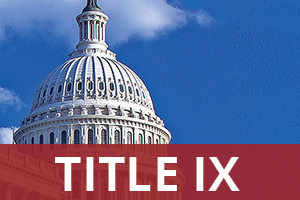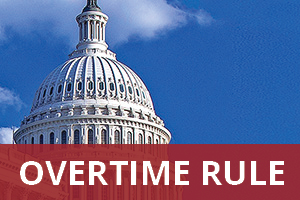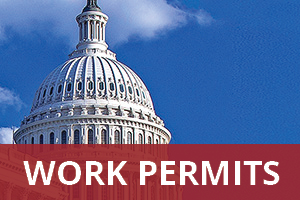by CUPA-HR | June 29, 2022
On June 21, the Biden administration released the anticipated Spring 2022 Unified Agenda of Regulatory and Deregulatory Actions (Regulatory Agenda), providing the public with a detailed glimpse into the regulatory and deregulatory activities under development across approximately 67 federal departments, agencies and commissions. Agendas are generally released in the fall and spring and set target dates for each agency and sub-agency’s regulatory actions for the coming year.
Based on a thorough review of the Regulatory Agenda, CUPA-HR would like to highlight the following proposed actions for members, including an updated target date for the release of a new overtime proposal.
Department of Labor
Wage and Hour Division – Defining and Delimiting the Exemptions for Executive, Administrative, Professional, Outside Sales and Computer Employees
According to the Regulatory Agenda, the Department of Labor (DOL)’s Wage and Hour Division (WHD) is now planning to release a Notice of Proposed Rulemaking (NPRM) to address changes to the Fair Labor Standards Act (FLSA)’s overtime pay requirements in October 2022. In the Fall 2021 Regulatory Agenda, WHD announced their intention to move forward with the NPRM with the goal “to update the salary level requirement of the section 13(a)(1) exemption [under the FLSA].”
Changes to overtime pay requirements have been implemented through regulations under both the Obama and Trump administrations. In May 2016, the Obama administration’s DOL issued a final rule increasing the salary threshold from $23,660 to $47,476 per year and imposed automatic updates to the threshold every three years. However, court challenges prevented the rule from taking effect and it was permanently enjoined in September 2017. After the Trump administration started the rulemaking process anew, in September 2019, DOL issued a new final rule raising the minimum salary level required for exemption from $23,660 annually to $35,568 annually. This final rule went into effect January 1, 2020, and it remains in effect today.
From April through June 2022, DOL held several listening sessions for interested stakeholders to discuss any support or concerns they may have with the anticipated rulemaking. CUPA-HR participated in all of the calls, expressing our concerns with the timing of the rulemaking as it relates to the ongoing challenges of the COVID-19 pandemic, a historically tight labor market, and increasing inflation.
Employment and Training Administration – Strengthening Wage Protections for the Temporary and Permanent Employment of Certain Aliens in the United States
In October 2022, DOL’s Employment and Training Administration (ETA) plans to issue an NPRM to establish “a new wage methodology for setting prevailing wage levels for H-1B/H-1B1/E-3 and PERM programs consistent with the requirements of the Immigration and Nationality Act.” The proposal will likely amend the Trump administration’s final rule that was scheduled to take effect on November 14, 2022, but was subsequently vacated by a federal court in June 2021. The new proposal, which is included in the Department’s Statement of Regulatory Priorities, will take into consideration the feedback it received in response to a Request for Information (RFI) on data and methods for determining prevailing wage levels “to ensure fair wages and strengthen protections for foreign and U.S. workers.”
CUPA-HR filed comments in opposition to the Trump administration’s regulations on the issue and in response to the Biden administration’s RFI.
National Labor Relations Board
Joint Employer
In July 2022, the National Labor Relations Board (NLRB) is planning to release an NPRM to potentially amend the standard determining when two employers may be considered joint employers under the National Labor Relations Act. The new standard will revise the 2020 Trump Administration’s final rule, which reversed the Obama-era NLRB decision in the 2015 Browning-Ferris Industries case and established that an entity can only be a joint employer if it actually exercises control over the essential terms and conditions of another employer’s employees. While details of the Democratic-majority NLRB’s NPRM on joint employer status are unknown, we would expect them to revise the current standard to reflect the Obama-era decision.
Department of Homeland Security
USCIS – Modernizing H-1B Requirements and Oversight and Providing Flexibility in the F-1 Program
In May 2023, the Department of Homeland Security (DHS)’s United States Citizenship and Immigration Services (USCIS) plans to release an NPRM to “amend its regulations governing H-1B specialty occupation workers and F-1 students who are the beneficiaries of timely filed H-1B cap-subject petitions.” The NPRM will specifically propose to “revise the regulations relating to ‘employer-employee relationship’ and provide flexibility for start-up entrepreneurs; implement new requirements and guidelines for site visits including in connection with petitions filed by H-1B dependent employers whose basic business information cannot be validated through commercially available data; provide flexibility on the employment start date listed on the petition (in limited circumstances); address ‘cap-gap’ issues; bolster the H-1B registration process to reduce the possibility of misuse and fraud in the H-1B registration system; and clarify the requirement that an amended or new petition be filed where there are material changes, including by streamlining notification requirements relating to certain worksite changes, among other provisions.”
ICE – Optional Alternative to the Physical Examination Associated With Employment Eligibility Verification (Form I-9)
According to the Regulatory Agenda, DHS plans to issue an NPRM in July 2022 to “revise employment eligibility verification regulations to allow the Secretary to authorize alternative document examination procedures in certain circumstances or with respect to certain employers.”
DHS has provided temporary flexibility in the Form I-9 verification process since the beginning of the COVID-19 pandemic. Specifically, the flexibility guidance allows for remote inspection of Form I-9 documents in situations where employees work exclusively in a remote setting due to COVID-19-related precautions. While that guidance is only temporary, DHS issued a Request for Public Input (RPI) on October 26, 2021, to determine whether those flexibilities should be kept in place permanently. It is possible that DHS will use that feedback to develop and implement this NPRM.
CUPA-HR has engaged with DHS on the Form I-9 flexibilities through the pandemic. Most recently, DHS announced an additional extension of the Form I-9 flexibility guidance through October 31, 2022. CUPA-HR sent a letter to USCIS Director Ur M. Jaddou asking for this additional extension. Additionally, CUPA-HR submitted comments in response to the RPI based on a recent survey detailing members’ experiences with the Form I-9 verification process flexibilities.
On June 7, ICE sent its proposal to the Office of Information and Regulatory Affairs (OIRA). OIRA is the White House office responsible for reviewing regulations and proposed regulations before they are publicly released and generally takes 30-90 days for this review, indicating ICE is on target to issue their proposal in July.
Department of Agriculture
Agriculture Acquisition Regulation: Internal Policy and Procedural Updates and Technical Changes
In December 2022, the Department of Agriculture (USDA) plans to re-propose an NPRM that was previously issued in February 2022 and included controversial provisions that would require federal contractors on projects procured by the agency to certify their compliance with dozens of federal and state labor laws and executive orders.
In the February NPRM, USDA provided only 32 days for stakeholder comment submissions on the proposal. CUPA-HR filed an extension request with the department asking for an additional 90 days to “evaluate the NPRM’s impact on [members’] research missions and collect the information needed in order to provide thoughtful and accurate input to the USDA,” as well as official comments that were pulled from 2012 comments CUPA-HR submitted with the Society for Human Resource Management (SHRM).
While it is unclear whether the December NPRM will include the blacklisting language again, the abstract of the re-proposal states that “the new proposed rule would be responsive to the comments received on our February 2022 proposal.”
Share This Article:






